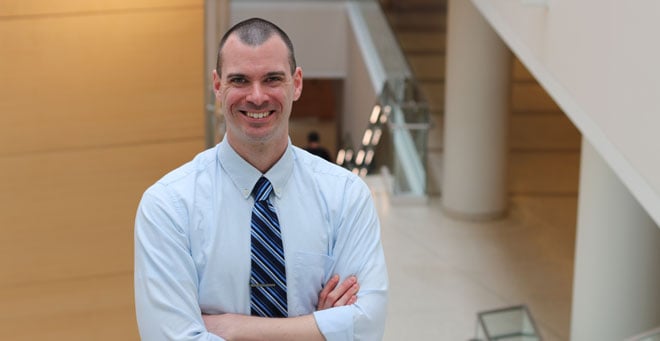 |
|
|
Brian Quattrochi, MD/PhD candidate and GSBS class speaker |
When Graduate School of Biomedical Sciences Class of 2017 speaker Brian Quattrochi takes the stage at Commencement 2017, he will share lessons he’s learned during his 10-year tenure at UMass Medical School, some difficult and many with the benefit of hindsight.
As an MD/PhD candidate, Quattrochi spent two years in clinical studies before joining the lab of Brian Lewis, PhD, associate professor of molecular, cell & cancer biology, for six years before completing his final two years of his clinical practice.
“To my core, I really am a lab geek and I’m grateful to the administrator that told me medical school wouldn’t be a right fit for me,” said Quattrochi, adding that without having had that difficult conversation he might not have discovered the true benefit of an MD/PhD program.
“In hindsight, it can be difficult to pick apart the two threads. The two disciplines inform and complement each other in ways that can really work.”
Through initially wrestling with whether he should go to medical school and then persevering after several rejections, Quattrochi said he came to better know himself. He realized he was drawn to an academic lab, where he could intertwine bedside medical care with basic science research.
He said UMMS has been an inclusive, collegial and collaborative community, where he has been able to pursue his long-held desire to research cancer. After graduation, he will travel to Brigham & Women’s Hospital for a pathology residency.
“Pathology as a discipline is one that absolutely requires and is informed by an MD, but it includes a population of people very lab-focused and who spend the majority of their time really thinking about the science behind disease and operate within the world of developing new therapies and diagnostics,” he said.
Medical school was life changing in a different way than the PhD, Quattrochi said.
“The clinical years solidified for me that research is a core component of who I am as a person and would be the centerpiece of what I would do moving forward as a career. No matter what I’m facing in the clinic, it always comes back to understanding the underlying process,” he said.
In the Lewis lab, Quattrochi’s research focused on whether changes to one particular cluster of mRNAs called mir-17~92 are important to the natural progression of pancreatic cancer. According to a paper he published this year in Oncotarget, Quattrochi and colleagues found that early lesions in mice that lack the mRNAs cluster appear to be more likely to regress back into normal tissue when compared to lesions in mice that maintained expression of the cluster.
“In cancer research, as a whole, everyone is very focused on end stage or metastatic disease; there seems to be very little momentum in the idea of generating prophylactic therapies,” he said. “I’m excited to potentially build a career in what I consider a pretty young field in precursor lesions plasticity.”
Dr. Lewis said working with Quattrochi was a special experience.
“It was clear from the beginning that he had a special intellect and great insight. In fact, the important breakthroughs in Brian's two primary research projects came from his careful evaluation of his data, and his keen insight that allowed him to see important connections where others may have missed them,” Lewis said.
On his time at UMMS, Quattrochi credits the support of his colleagues and Lewis; his ability to pursue other positions, including student leadership, teaching and mentoring; and guidance provided by the GSBS Center for Biomedical Career Development, which encouraged him to collaborate across disciplines and position himself as a clear communicator and leader with essential marketable skills.
“With respect to the future, I expect Brian to be a leader at an academic health sciences center. As a student, Brian was a triple threat - excellent in research, teaching, and service to the institution. He clearly has the ability, but he has also demonstrated the traits of a true leader. He is committed, puts in the work, and is willing to make sacrifices of himself for the greater good,” Lewis said.
Quattrochi is not naive to the challenges in academic research.
“The funding challenges are very real. To speak for tomorrow’s scientists is very daunting because the political and financial climate is very troubling. It can be a struggle to stay involved in academic research,” he said. “However, the universal truth of anyone who gets a PhD is perseverance. We all share complete commitment to our work. The process of science is really wisdom through failure, the ruling out of possibilities. It’s magical,” he said.